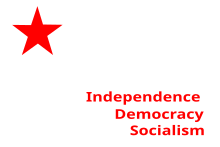Kerala Students Union
Kerala Students Union is the Kerala branch of the National Students Union of India, the student wing of the Indian National Congress. KSU was founded on May 30, 1957 in Alappuzha.
At chearthala S.N collage.
KSU entered the center stage of student politics in Kerala with the famous "Orana Samaram", a strike for travel concessions for students in buses and boats of the state. The ruling Communist government of the state lead by EMS Namboodiripad dealt with the agitation with an iron fist including widespread police attacks on students, lathicharges and arrests. But the agitation was a huge success, and the government had to relent to the demands of students. From then onwards, the growth of KSU was tremendous. KSU became a "fashion" among the student community and with incessant struggles, the organization could achieve many a milestones of achievements. Unification of fees in government and private schools and colleges, constitution of college unions and university unions through regular elections, university arts festivals, representation for students in the senate, syndicate and academic councils of universities, eradication of detention system, free education up to the plus two level etc. are only a few examples among the vast variety of achievements to its credit. Thousands of students had to shed their sweat and blood on the streets to achieve these, and the greatest of them had to lay their lives itself, like Sudhakar Akkithai, Santharam Shenoy, Thevara Murali, Francis Karippayi and K.P. Sajithlal. Though KSU regularly intervened effectively in the academic field, its effect was not restricted to that alone. It is perhaps the first student movement in India, which could even overthrow a government. The communist oppressive regime of EMS, which had proved to be a threat to constitutional democracy itself, was thrown out of office through the agitations and relentless efforts of KSU in 1960. In the 1970's, KSU played its decisive role in retaining the faith of student community in the constitutional machinery and non-violent means of social change, in the days when naxalism and armed adventures spread as a wave in college campuses. The organization became a watchdog of idealism in politics and it could bring an end to the 'aayaram gayaram' syndrome (frequent defections of politicians from one party to another) of Kerala politics of the 1950s. Many of its founder leaders like A.K. Antony, Vayalar Ravi, Oommen Chandy, A.C.Jose and V.M.Sudheeran are still the darlings of millions of people. It injected fresh blood into the Congress party and a whole generation of new leaders entered into the political arena, a lot of them M.P.s, M.L.A.s and even two Chief Ministers. KSU was always a role model for other democratic student organizations of the country. Even the NSUI was formed at the national level taking inspiration from KSU in Kerala and the 'Chhatra parishad' in West Bengal. But KSU suffered some setbacks after the emergency period (1975-77) and consequent split in the Congress party. By then, factionalism in the Congress peeped into this organization also, which made it somewhat weak. This was exploited by SFI, ABVP and other communal organizations to a considerable extent. They tried to criminalize campus politics and derogated it of its charm and values. KSU workers are widely attacked in the campuses and they are not given the freedom to work and campaign. But KSU still retains its position as the biggest democratic student organization attracting support of a substantial section of the student community. KSU always stood for the legitimate rights of the student community irrespective of who rules, and it continues this legacy even today. It put up a series of agitations against the corruption in plus two schools allotment policy of the previous LDF government and is now going ahead with agitations against the irregularities in the self-financing institutions policy of the present government. A brave war front is also put up against the attempt to "Marxistise" school textbooks






